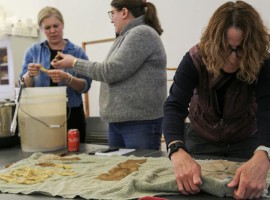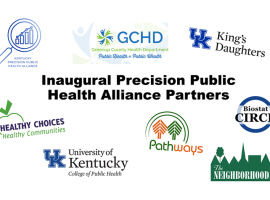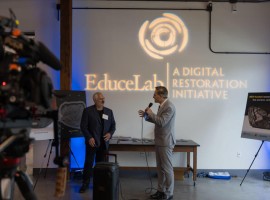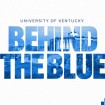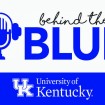'Behind the Blue': UK’s Corey Baker Bridging Diversity Gap in Computer Science
The University of Kentucky’s Department of Computer Science within the College of Engineering was formed in 1966, making it one of the oldest departments of its kind anywhere in the nation.
Now one of its younger faculty members, Corey Baker, is helping to lead the way for the department in bridging the diversity gap. Baker, who is in his second year as an assistant professor at UK, believes universities must do a better job recruiting, retaining and graduating minority students in engineering. Thus far, his extensive efforts are proving to be very successful.
On this week’s episode of “Behind the Blue,” UK Public Relations and Strategic Communication’s Carl Nathe talks with Baker about student recruitment and about his teaching, research and service.
Become a subscriber to receive new episodes of “Behind the Blue” each week. UK’s latest medical breakthroughs, research, artists and writers will be featured, along with the most important news impacting the university.
For questions or comments about this or any other episode of "Behind the Blue," email BehindTheBlue@uky.edu or tweet your question with #BehindTheBlue.
[MUSIC - "ON! ON! U OF K"]
(SINGING) On, on, U of K, we are right for the fight today. Hold that ball and hit that line. Every Wildcat star will shine. We'll fight, fight, fight!
[MUSIC SLOWS]
[RECORD SCRATCH]
[MUSIC PLAYING]
ANNOUNCER: From the campus of the University of Kentucky, you're listening to Behind the Blue.
The University of Kentucky's department of computer science within the College of Engineering was formed in 1966 making it one of the oldest departments of its kind anywhere in the nation. Now one of its younger faculty members, Corey Baker, is helping to lead the way for the department in bridging the diversity gap. Baker, who is in his second year as an assistant professor at UK, believes universities must do a better job recruiting, retaining, and graduating minority students in engineering. Thus far, his extensive efforts are proving to be very successful.
KODY KISER: I'm Kody Kiser with UK PR and marketing. On this week's episode of Behind the Blue, UK PR's Carl Nathe talks with Baker about student recruitment and about his teaching, research, and service.
[MUSIC PLAYING]
CARL NATHE: We are pleased this week to be joined on the Behind the Blue podcast by Dr. Corey Baker who is an assistant professor of computer science here at the University of Kentucky Computer Science Department, very well-regarded, very cutting edge, and part of our UK College of Engineering. First of all, Corey, thanks for coming over, especially-- as we tape this-- a rainy morning. But you made it safe and sound.
COREY BAKER: Thanks for having me.
CARL NATHE: All right. Tell us a little bit about your background. I always like to know how people ended up in the career they're in and how they got to this point. First of all, where were you born and raised?
COREY BAKER: So I'm a military kid. So I was born, actually, in Camp Pendleton, California. And then I was raised in Los Angeles, California.
CARL NATHE: OK. And talk about your education. Did you did you get to go to school in the same town, or did you have to move around after that?
COREY BAKER: Los Angeles is basically where I did high school. And so we moved around about every four years. I was always switching schools. So most schools I've been to, I've been to at least two in the time period.
CARL NATHE: And then how did you go about choosing a college, and where did you end up going?
COREY BAKER: So actually, I started my undergraduate career at Alabama State University, so a historically black college. And I was there for two years. And I wanted to actually do computer engineering, so I end up transferring and did the completion of my bachelor's degree in computer engineering at San Jose State University in northern California.
CARL NATHE: What appealed to you about computer engineering and computer science?
COREY BAKER: I guess I never really knew about engineering or computer science when I was growing up. But my fascination with computers, wanting to be the computer monitor in the class, always wanting to learn the commands, I've always been interested there. And then also, I've always been interested with anything with electricity, so something that was powered-- if something was broken, I always believed I could fix it. So like many people that entered into computer science and engineering, I didn't realize it, but I was always trying to solve a problem.
CARL NATHE: When I talk to people that go into engineering, that's the greatest thing about it. If you've got a mind that wants to solve problems, it's the right field.
COREY BAKER: Sure. And one of the things I remember, when I was younger, my parents-- I used to always convince them to buy me something that was kind of expensive, if I wanted a toy. I wouldn't want the smaller toys, but I'd wait and say, I want that one. And it'll be expensive. And then, you know, of course what kids do, they break things. And it would break, and I'm like, no. It's not all the way broken. I can always fix it. And so I had no choice but to fix it if I wanted to keep getting expensive toys.
CARL NATHE: Excellent. Undergraduate degree from San Jose State in California. Then what about graduate school?
COREY BAKER: So graduate school, I went and actually did a master's first. So I went to California State University, Los Angeles. So I did my master's there. And then I went to the University of Florida where I got another master's degree and did my PhD there.
CARL NATHE: PhD at Florida in Gainesville. And of course, that's another Southeastern Conference school. So tell us, when you get your doctoral degree from the University of Florida, what comes next?
COREY BAKER: After Florida, I actually went to a postdoc fellowship. So I went back to California. I was at University California, San Diego. And I was there for a little bit over two years, basically training to be a faculty member.
CARL NATHE: And then I guess when you're done with the postdoc, it's time to find a faculty position, yes?
COREY BAKER: When I'm hoping that I was ready to go into a faculty position, I started applying to schools, going to other venues. And actually, that's how I got exposed to UK, because I was at a conference-- I believe it was in Atlanta-- where I met Dr. Sonja Feist-Price. And she was like, hey, when are you finishing up school? Let me see your CV? And then she came back. She called the department chair at the time, Brent Seales, and they said they were really interested. So she said, yeah, you should come to UK, really give us a shot. And that's how I start looking at UK.
CARL NATHE: And Sonja, of course, who you mentioned, just for our audience's sake, Dr. Sandra Feist-Price is Vice President for Institutional Diversity here at the University Kentucky and a longtime faculty member in the College of Education here UK. Well, the process goes along. When do you come on board? When do you actually start as a faculty member here?
COREY BAKER: So I started January 2018.
CARL NATHE: Very good. So just in your second year.
COREY BAKER: Yes.
CARL NATHE: So far so good?
COREY BAKER: Yeah, it's been great so far. I've been enjoying it. I've had the opportunity-- most of the classes I've taught so far have been graduate courses. But I taught my first undergrad course last fall. And then I'll be teaching that same course again this upcoming fall.
CARL NATHE: It's exciting to be in a field-- computer science and computer engineering is kind of pushing our society forward. There are things-- I've talked with Dr. Seales along the way. I've interviewed him before. But there's stuff that's being done now with computers we couldn't have imagined. And then we carry around with our mobile phones, our cell phones, our devices-- we've got more power in there than back in the day a computer that would fill this room, which is about 12" by 14". It would take that big to have a computer to have what you can do with that little phone of yours. It's amazing, but we keep pushing forward the new frontiers.
COREY BAKER: Yeah, sure. I think it's also, with respect to the time when you have a certain amount of innovation, the big thing with computers is they enable computation. Since it seems like everything that we do around the world is based off mathematics, even when those older computers came out, it was a large ability to do computations, if you go back to how calculations were done before and everything was done by hand. And so those innovations just keep pushing and allow us to thrive and basically create new solutions for people to use. And I think it's awesome.
CARL NATHE: Now one thing-- and this is audio on the internet and/or radio, this interview, but one of the things I wanted to talk to you about because you are an African-American gentleman, but successfully bridging the diversity gap in computer science. Let's be honest. This has not been a field historically that has a lot of people, a lot of diversity in the field. Am I right?
COREY BAKER: Yes, that's true. I think from across the board, when it comes to undergraduate, graduate, faculty, the numbers have been extremely low compared to many of the numbers that are even coming out. And I think that's at every university.
CARL NATHE: That's one of the things that you have hit the ground running and kind of tackling that challenge, if you will.
COREY BAKER: Sure. I think I've been doing OK with it so far. We've been making large strides here in computer science and in the College of Engineering. One of the things that-- after my interview and when I got made the offer, when I sat down and talked to Dr. Seales, I let him know that there's a mechanism that I think I have in place that can drastically increase numbers and bring talented students here to UK. And his response was to support it. And I think with that, we've made some changes.
So right now in computer science, we have five black PhD students in the program, which is the largest that the CS department has had in its history. And it sounds like a small number, but that makes up about 7% of our department. When you look across the board at all Research I's for PhDs, for black students, they're about 1.3%. So when you see that we're here at 7% and we're continuing to grow the numbers, that's there.
Of my PhD students-- I have four PhD students in my lab-- three out of four of them are women. And so when it comes to looking at ethnic minorities and also minorities in terms of gender, we've been doing some things here in CS, and then also now growing to the College of Engineering to where students are going in all these departments now to kind of change the look and feel of the departments.
CARL NATHE: As you said to me as we were getting ready to tape this interview, one of the things you want to do is just dispel myths that are out there.
COREY BAKER: Yes. There's a lot of myths and uncertainties when it comes to both sides. So one, from a university standpoint, a lot of times people feel in order pursue a diversity path that you need to lower the barrier of entry, particularly when it comes to graduate school. And one of the things we're showing with the program that we have here is that that's not true. So the students in my research lab, two of them have 4.0s. They're going into the third year, third year and second year. And the average GPA amongst them is the 3.8 something.
And so the students are doing well. They've come from phenomenal institutions before that were from different states, and showing that, hey, the students can come here. And we can basically dispel that myth when it comes to what faculty perceive-- not just UK faculty but across the board of the barrier to entry.
Now, on the other side, many of the students that we brought here so far are not from the state of Kentucky. So certain people have perceptions about the state, particularly when it comes to underrepresented students, just because historically-- I mean, all states-- I mean, sometimes people give a larger connotation to Kentucky. But all states have done a lot of things that are wrong or should be considered wrong. And for students, one of the first things I get asked, especially if I'm recruiting an African-American or a Latino student, is that, hey, is Kentucky a safe space for me?
And so, one, I have to speak to Lexington and to speak to the university and then show that, hey, there is a safe space. And now it's a little bit easier since I have some students here, because they could speak to it as well. And students don't think that I'm just trying to convince them to come to UK to increase the number.
CARL NATHE: Success breeds success.
COREY BAKER: Exactly.
CARL NATHE: You've got some unique aspects to this, and it's paying off-- the numbers in terms of the applicants that you have to the program. Let's talk about that a little bit.
COREY BAKER: Sure. So one of the things that's kind of front-facing that people are seeing is the graduate school visit, the graduate campus visit. And many schools have graduate campus visits. We're doing it a little bit different. And the way that we've been able to spin it off-- we had 100 students apply to the program. So these are 100 students that said they were interested in graduate school at UK. And some of them might not be graduating yet, so some of them are grouped into REU category, which is Research Experience for Undergraduates, and also graduate students.
And so the average GPA of the students that applied was 3.5. And we've done a lot of cool things. One of the things that we've been able to leverage with the program-- and I think that kind of helped get that number to 100-- is I started tying the engineering aspects to the sports aspects of University of Kentucky and to many of the other natural aspects here as well or natural resource aspects. So, one, sports I look at. I've used a natural resource here at University of Kentucky, the distilleries and things like that.
And so when the students came out, we went to a basketball game. And so they got to see Lexington. They got to see the campus. And then at the same time, of course, they were visiting with the faculty here, other graduate students, to basically dispel the myths I talked about to the graduate students.
CARL NATHE: Because when you're going for graduate-level education-- well, any education. Yeah, you've got classroom work. You want great professors and so forth. But it's your life. You're living there.
COREY BAKER: Sure. For computer science and engineering, it's usually the next five to seven years of your life. Sometimes the people who are coming into graduate school are all different ages. Some people have families. So they kind of want to know what types of things are there.
And I think people don't realize how much great things are around Lexington when it comes to food, when it comes to restaurants, living, stores, malls. There's a lot of that here that people, I think-- what I see the students usually get surprised by.
CARL NATHE: You are going to be featured or recently were featured, I should say, on NBC Learn, a program that's produced by NBC News.
COREY BAKER: Yes. So that was a unique opportunity, where I want to say they interviewed about 20 researchers related to engineering. They basically use it to create a program to educate and inspire kids who are K through 12. So they have an engineering curriculum wrapped around when they do these interviews.
So you speak about your research. You speak about how you got into the field. And then they tie it to, all right, now we're going to do some lab exercise for all ages.
CARL NATHE: What about in terms of your own research? Because that is a big part of what you do at a Research I university-- research, teaching, service, outreach. You're doing all those things, but let's talk about some of your specific research.
COREY BAKER: My research is in wireless communication, particularly when you have limited internet. So limited internet situations comes up when you have, say, a natural disaster or more prevalent here in Appalachian Kentucky, there's not a lot of cellular communication. There's been millions of dollars spent to try to bring broadband to Appalachian Kentucky. And the reason why that could be helpful is-- one of the projects we're working on is a partnership with Markey Cancer Center, University of California San Diego, the FCC--
CARL NATHE: Federal Communications Commission.
COREY BAKER: Yes. It's called LAUNCH. It's called Project LAUNCH, which there's been a number of UK articles about Project LAUNCH doing patient monitoring in Appalachian Kentucky. So remote patient monitoring has helped across the United States. It's helped patients, and their mortality rates are decreased, actually, except for in Appalachian Kentucky.
Part of that is broadband access. When cancer patients are-- their primary doctors are here at UK Hospital. And they're anywhere from two to four hours away. By the time they see their doctors, many times they could have been treated differently, or they could have been suggested to go somewhere else to kind of help decrease their stress level. And stress has been tied to the reasons why when somebody has cancer they tend to decrease faster.
And so one of the things that we do with their research that I work on is when we create mobile applications, interfacing with the patient-- but then two, under those mobile applications, creating a wireless communication that basically works device-to-device. So basically my phone can talk to your phone, can talk to a vehicle, can talk to something that's in a stationary building. So when you start leveraging how people move, who they interact with, the stores that they go to, you can deliver this information with a delay, of course, but you don't need to spend as much money on a cellular infrastructure to deliver that. And basically we're hoping to enable patient monitoring in these areas to where moving things that they typically fill out on paper to an application format where people might see, or doctors might see, responses in terms of hours as opposed to days or weeks.
CARL NATHE: One of the things that impresses me when I hear talk-- Dr. Corey Baker is our guest here on the Behind the Blue podcast-- the work that you're involved in, it's very much cutting edge. And it's good to let people know that the cutting edge work that's going on in computer science and computer engineering isn't just happening at MIT or institutions like that-- Georgia Tech and so forth. University of Kentucky, we don't take a backseat to too many people when it comes to computer science.
COREY BAKER: True. I mean, computer science at UK, I believe, is one of the oldest computer science programs in the country. We have talented faculty here. And I think one of the benefits is that it's very collaborative, operates different from the few schools that I've been to. You have different environments that you operate in. As a faculty member, I truly enjoy being in the computer science environment here, as well as the interactions I've had with other engineering faculty.
CARL NATHE: Here on your plate you've got graduate students. You've got undergraduate students. You teach classes. You do research. You've got service and outreach. But you've got your own career-- in other words, you've got certain things that are required of you. You're an assistant professor. You're in your second year as a full-fledged faculty member at University of Kentucky. You've got to build your own career, but you're building it by doing all these things. That's how you want to work towards-- you're an assistant professor. You work hard enough, and you get tenure and become an associate professor. And then eventually down the road, if you work hard enough and long enough, you're full professor. It's a lot of work.
COREY BAKER: The primary focus is research. That's what your tenure is mostly based off of. I've been fortunate enough to get some things rolling where the other things are going to just grow on their own, or they should grow on their own. With the cutting edge aspect and the wireless technology, there are some cool things that we're doing there. I mentioned that the students are doing well academically, but also they're the ones that are contributing and kind spearheading that research.
There's also things that we're doing with Low Cost Smart City. So all cities are trying to-- many cities are saying they want to become a smart city. And a smart city is essentially putting technology on every entity you see. So a stop sign can tell how many cars have come by. The traffic lights basically respond to how people are driving by. Parking lots can tell you how many cars are left or where to go.
And so a lot of this is tied to wireless communication, and it costs millions to billions of dollars for these cities to become a smart city. So cities want to become smart cities. But financially, they might not be able to afford it. So with Low Cost Smart City, one of the things we're trying to do is leverage this device-to-device communication. And even in developing areas, people still have cell phones. So if you can bounce information off of the people that's using a cell phone and show that all information doesn't need to be delivered in real time, you can start creating these low cost smart cities for a fraction of the cost of what a typical smart city would be.
CARL NATHE: I want to get back, Corey. We have a couple more minutes. But successfully bridging the diversity gap in computer science-- we spoke a little bit before about how you're doing that. But one thing I want to touch upon, because rightfully so, University of Kentucky is striving hard, and slowly but surely I believe, making strides in terms of diversity. And I'm talking about not only in the student body but the faculty. But the fact that you have so many of these people pursuing advanced degrees in computer science that are your graduate students, that are African-American women and bringing a lot of diversity, this is the way it needs to be done.
I think I said before we started taping, you can't snap your fingers and wish it to happen. It's a lot of hard work. You've got to develop this talent and show them that they can do it here at the University of Kentucky and they can have as great an opportunity as anywhere.
COREY BAKER: Sure. So it's always interesting, because I think especially for computer science and engineering, when you finish your PhD, there's two things you look at. You either look at industry or you look at academia. When you think about industry, there's a lot of large companies out there like Google, Apple, Intel, all those large companies, Uber. And they offer a lot of money. And then the other side is if you have an interest in research and teaching, you say, I want to go into academia.
And so the great thing about what UK has been doing for years-- and then when adding on this increased diversity, putting out talent, PhD talent, to industry and academia and all these other places-- because once those entities see the great work that comes out of UK, other people around them are going to say, hey, I want to go to UK and get training like that. Or they're going to say, I want to continue to hire talent from there because I see the great work that they do here.
CARL NATHE: Last thing I wanted to bring out, and then I want to give you a chance to add anything. And we can go as far or as little into this as you want. But I'd like to find out a little bit about people's personal life as much as they're willing to talk about. You mentioned someone who's a big part of your life.
COREY BAKER: Oh, I have a fiance. We're getting married July 5, so coming up. I have a daughter. They have been enjoying Kentucky. They've been here a little bit less time than I have. They came out about July last year, so they've been here for about a year now.
CARL NATHE: So you've got a lot happening in your life. It's a big summer for you. It sounds to me like I'm talking to somebody that feels good about the choice they made to join the faculty here at the University of Kentucky.
COREY BAKER: Oh, yeah. I've been enjoying it. I'm enjoyed my time at UK, enjoying my time here in Lexington. Both of those things need to factor in when people make decisions. I would say I'm more than comfortable in both and happy to be here. And I think that because I'm comfortable, what basically gives me more energy to do well in research, and teaching, and everything else.
CARL NATHE: I want to give you a chance to add anything and maybe I can help set that up. What would you say to students, parents, and maybe faculty members at other institutions that might, through the magic of the internet, hear this interview? What would be your statement to them as far as UK and the Department of Computer Science and the College of Engineering?
COREY BAKER: Great things are happening here. My goal is just how UK has done a phenomenal job and is known for sports, essentially all sports. If I can help computer science, engineering be known in that same right, we have all the resources. We have the foundation for it. We've been doing well. Now is, I think, UK's time to shine and basically show that we can be a game changer when it comes to engineering.
CARL NATHE: Well, thank you so much. It has been an absolute delight for me to get to meet you, Dr. Corey Baker, assistant professor of computer science in the Department of Computer Science, which is part of the University of Kentucky's College of Engineering. Thank you so much.
COREY BAKER: Thank you.
CARL NATHE: And we will see you next time on the Behind the Blue podcast.
[MUSIC PLAYING]
ANNOUNCER: Thank you for joining us on this edition of Behind the Blue. For more information about this episode or any other episode, visit us online at uky.edu/behindtheblue. You can send questions or comments via email to behindtheblue@uky.edu. OR tweet your questions using #behindtheblue. Behind the Blue is a joint production of University of Kentucky Public Relations and Marketing and UK HealthCare.
[MUSIC PLAYING]
